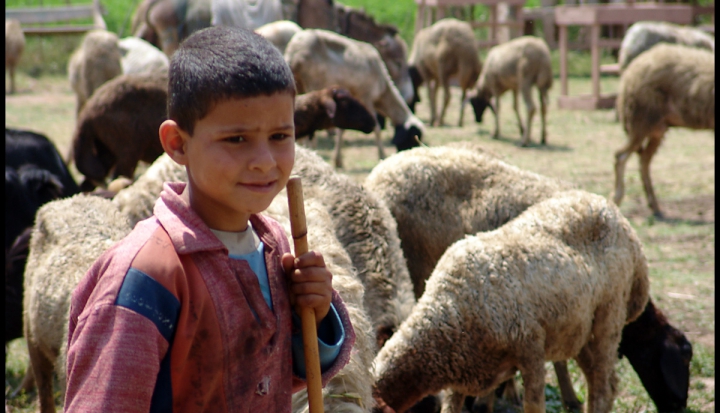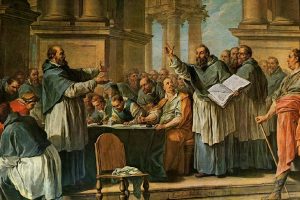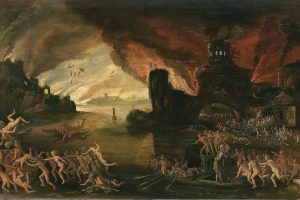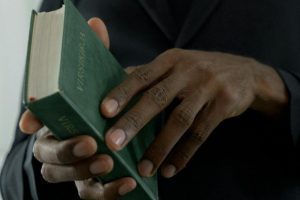Would you recognize the word of God? Not the words from the Bible, which are sufficiently formal and weighty to convey proper divine authority, not to mention familiar. But that voice calling in the desert. That small, still feeling in our heart. The God who is still speaking to us in our daily lives.
My coworker recently lent me the DVDs of the CBS show Joan of Arcadia (2003–2005). For those of you unfamiliar with 12-year-old television, the show centers around a teenage girl, Joan Girardi, who encounters God on a daily basis. But this God is neither a bearded, elderly Father figure nor a long-haired Christ. God isn’t even a dove, a wind, a flame, or any of the symbols we associate with the Holy Spirit. No, the God who talks to Joan takes the form of a cute boy on the bus, a little girl, a homeless man—in other words, the last person you’d expect to be speaking with God’s words.
Joan doesn’t have some special power or unique relationship with God. She has not taken religious vows, she is not an ordained minister. She is a teenage girl, who worries about studying for her chemistry final, has crushes on boys, and what to wear to prom. She didn’t choose to hear God’s voice, or to live with the fear and uncertainty that must come with encountering the Divine in the most unexpected places possible. The difference between her and the rest of us is that unlike the majority of people, she is willing to stop, to listen to the people talking to her, and to believe.
In the first reading during Mass this Sunday, we hear the story of another reluctant prophet—Amos. God appeared to Amos and gave him prophecies concerning the future of Israel. Have you ever noticed how prophecies in the Bible never seem to be about future prosperity and unbridled happiness, but instead destruction and lamentation? Well, soon enough, this foretelling about the destruction of Israel reached the people in power—in this case, the high priest and the king. The high priest sent for Amos and threatened him, telling him to leave Israel because his prophecies against the Israelite government would not be tolerated.
Amos’ response? “I am no prophet, nor a prophet’s son. But I am a herdsman, and a dresser of sycamore trees” (Amos 7:14). Amos bluntly tells the high priest that he didn’t choose this life; God chose him. Like Joan, he is special only because he listened to what God was telling him to do. But now that he has listened, it’s not a message that he can ignore.
For Amos, listening to God meant being truthful at all costs. It is not always a safe or smart thing to predict the death of the king. But Amos refused to let politics get in the way of his mission from God. He continued on preaching and prophesying his message of social justice and God’s love for the poor.
Imagine being in Amos’ shoes. He is a young man, living in the country, with little to no experience of politics or the world beyond his hometown. But one day, while out in the fields with the sheep, he hears a voice, telling him that God hears the cry of the poor—people who are very much like himself—and is sending Amos to speak for them.
Amos doesn’t ignore the voice, he doesn’t persuade himself that he’s crazy or tell God that he’s the wrong person for the job. Instead, he listens. He proclaims God’s word faithfully. Until one day God tells him that the king of Israel is going to die in battle. All of a sudden, Amos is called to the palace—a place he might have dreamed about visiting, but certainly never thought he’d actually see. It would be like if the President’s Chief of Staff thought something you did was a threat to the President, so called you in to have a little personal chat. By some miracle, Amos doesn’t bow before power that is so much greater than his own. He stands firm, even having the courage to warn the high priest that bad things will happen to those who stand in his way.
A teenage girl and a young shepherd—not exactly the stereotypical prophets. If we came across them, would we recognize them as speaking with the weight of God? Even more importantly, if God came to us, would we listen? Could we see God in the stranger on the bus or the voice in the field?
It is so easy to tell ourselves that God does not speak through us. We are not priests, we struggle just to go to Mass. We are just ordinary people. Who are we to speak for God? But we are called, like Joan and Amos, to work alongside God. To care for the marginalized, the bullied, the sick, and the forgotten. To add our voice to the others. We, too, are the prophets, called to proclaim God’s word to those who need to hear it.












